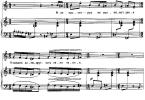“Here is the window again...” Marina Tsvetaeva
Here's the window again
Where they don't sleep again.
Maybe they drink wine,
Maybe they’re sitting like that.
Or simply - hands
Two cannot separate.
In every home, friend,
There is such a window.It was not from candles, but from lamps that the darkness was lit:
From sleepless eyes!The cry of separations and meetings -
You, window in the night!
Maybe hundreds of candles,
Maybe three candles...
No and no mind
My peace.
And in my house
It started like this.Pray, my friend, for the sleepless house,
Out the window with fire!
Analysis of Tsvetaeva’s poem “Here is the window again...”
In 1916, after a stormy affair with Sofia Parnok, Marina Tsvetaeva returned to her husband Sergei Efron, although she was aware that her married life was unlikely to be happy. During the same period, the poetess created a cycle of poems called “Insomnia,” which includes the work “Here to solder the window...”. It is dedicated to the inner experiences of the author, who finds it difficult to come to terms with the imperfections of the world around him and find the strength to continue living as before - serenely, easily and joyfully.
“Here is the window again, where they don’t sleep again,” this phrase indicates Tsvetaeva’s attempt to generalize human experiences. It’s as if she’s trying to put herself on a par with other people, to hide in the crowd so as not to stick out her own pain. According to the poetess, everyone has moments in life when insomnia comes. And then the windows in the houses glow at night, behind which there are people with their thoughts and feelings. “Maybe they drink wine, maybe they sit like this,” notes Tsvetaeva. There are happy exceptions when sleepless nights give two people a feeling of love and spiritual unity.
The luminous window becomes for the poetess a symbol of a wide variety of experiences. After all, insomnia is the result of our emotions, which can be both positive and negative. “The cry of separations and meetings - you, window in the night!” notes the author. In this case, it does not matter at all whether one candle is burning behind the glass, or whether the room is brightly lit from the inside, reminiscent of Christmas illumination. Behind every such light lies sorrows and troubles, happiness and joy of meetings with loved ones. And each such light carries spiritual turmoil, a consequence of insomnia, which has recently become a frequent guest of Marina Tsvetaeva. “And this has happened in my house,” she notes, pointing out that her own window has recently also glowed in the dark, serving as a kind of beacon for lonely passersby. But they don’t care about other people’s experiences, and this is not surprising. Nevertheless, the poetess still turns to an unknown passerby with a request: “Pray, my friend, for the sleepless house, for the window with fire!” More recently, she would have just as easily walked past the glowing window rectangle, but now she knows from her own experience how insidious insomnia is, and how much trouble it can bring to a person deprived of mental balance, calm and peace.
Marina Tsvetaeva wrote the poem “Here is the Window Again,” which was included in the poetic cycle “Insomnia” in 1916 during a very difficult period for herself. At this time, she returned to her husband, Sergei Efron, after a whirlwind romance with Sofia Parnok. The poetess understood that her marriage would no longer be happy; her soul was tormented by doubts and worries. The poems of this period are an attempt to come to terms with the imperfections of the world and find the strength to live a joyful and serene life.
Here's the window again
Where they don't sleep again.
Maybe they drink wine
Maybe that's how they sit.
Or simply - hands
Two cannot separate.
In every home, friend,
There is such a window.
The cry of separations and meetings -
You, window in the night!
Maybe hundreds of candles,
Maybe three candles...
No and no mind
For me - peace.
And in my house
It started like this.
Pray, my friend, for the sleepless house,
Out the window with fire!
Many years later, Tsvetaeva’s poems were set to music. And they were performed by Elena Kamburova
Fans of Silver Age poetry will be interested to see - from carelessness to doom.
#X3m, #X3mzhb, #Am42zhm, #Am4342zhm, #Ya42md
THREE SONGS
based on poems by Marina Tsvetaeva
Music by Boris Tishchenko
1. WINDOW
Here's the window again
Where they don't sleep again.
Maybe they drink wine,
Maybe that’s how they sit.
Or simply - hands
Two cannot separate.
In every home, friend,
There is such a window.
The cry of separations and meetings -
You, window in the night!
Maybe hundreds of candles,
Maybe three candles...
No and no mind
My peace.
And in my house
It started like this.
Pray, my friend,
For a sleepless house,
Out the window with fire!


2. LEAVES FALLED OFF
The leaves fell over your grave,
And it smells like winter.
Listen, darling, listen, darling:
You are still mine.
Laugh! - In the blessed lionfish of the road!
The moon is high.
Mine - so undoubtedly and so immutably,
Like this hand.
I'll come up with a bundle early in the morning again
To the hospital doors.
You just went to hot countries,
To the great seas.
I kissed you! I cast a spell for you!
I laugh at the darkness beyond the grave!
I don't believe in death! I'm waiting for you from the station -
Home!
Let the leaves fall, washed away and erased
There are words on the mourning ribbons.
And if for the whole world you are dead,
I'm dead too... dead too... dead.
I see, I feel, I smell you everywhere,
What ribbons from your wreaths! -
I haven't forgotten you and I won't forget you
Forever and ever.
I know the aimlessness of such promises,
I know futility. -
Letter to infinity, - Letter to infinity. -
A letter to the void.







3. MIRROR
I want to be at the mirror, where there is dregs
And the dream is foggy
I'll ask you where to go
And where is the refuge?
I see: the mast of a ship,
And you are on deck...
You are in the smoke of the train... Fields
In the evening complaint...
Evening fields in dew,
Above them are crows...
- I bless you for everything
Four sides!
- I bless you for everything
Four sides!
- I bless you for everything
Four sides!



For the third poem (“I want to be at the mirror, where the dregs…”) there is also a famous romance by Mikael Tariverdiev, written for the film by Eldar Ryazanov “The Irony of Fate, or Enjoy Your Bath” (1975).
Marina Tsvetaeva was passionately interested not only in representatives of the stronger half of humanity. She had a fairly close relationship with the poet and translator S. Parnok. To read the poem “Here is the window again” by Marina Ivanovna Tsvetaeva means to witness how she is trying to come to her senses after the “first catastrophe in her life.”
The poem was created in 1916. It is the final chord of the two-year romance between Tsvetaeva and S. Parnok. After breaking up with his girlfriend, the poet returns to her husband. But family life continues to weigh on her. The text of Tsvetaeva’s poem “Here is the window again,” which is taught in a literature lesson in the 10th grade, reflects the author’s spiritual disharmony. For the heroine suffering from insomnia, the window is a symbol of piercing loneliness, meetings and separations.
You can download this work in full or study it online on our website.
Here's the window again
Where they don't sleep again.
Maybe they drink wine,
Maybe that’s how they sit.
Or simply - hands
Two cannot separate.
In every home, friend,
There is such a window.
It was not from candles, but from lamps that the darkness was lit:
From sleepless eyes!
The cry of separations and meetings -
You, window in the night!
Maybe hundreds of candles,
Maybe three candles...
No and no mind
My peace.
And in my house
It started like this.
Pray, my friend, for the sleepless house,
Out the window with fire!
Here's the window again
Where they don't sleep again.
Maybe they drink wine,
Maybe they’re sitting like that.
Or simply - hands
Two cannot separate.
In every home, friend,
There is such a window.
It was not from candles, but from lamps that the darkness was lit:
From sleepless eyes!
The cry of separations and meetings -
You, window in the night!
Maybe hundreds of candles,
Maybe three candles...
No and no mind
My peace.
And in my house
It started like this.
Pray, my friend, for the sleepless house,
Out the window with fire!
Analysis of the poem “Here is the window again, where they don’t sleep again...” by Tsvetaeva
After M. Tsvetaeva broke up with S. Parnok, she returned to her husband. The poetess had no illusions about returning to a calm family life. There was a wide crack between the spouses. Tsvetaeva could not calm down, indulging in painful thoughts. The result of this was the poetic cycle “Insomnia”, which includes the poem “Here is the window again...”.
Having experienced the burden of sleepless nights, the poetess turns to the symbol of such a state - a window illuminated in the night. Random passers-by rarely pay attention to the windows of houses burning in the darkness. But behind each of them lies someone’s great pain or great joy. People who lead a calm and measured life sleep at night. Only extraordinary events cause insomnia. Perhaps they are “drinking wine” outside the illuminated window, pouring it on their grief or melancholy. Or all night in the light, “two hands cannot separate” lovers. By stating that every house has such a window, the poetess means that an event happens in the life of every person that makes him not sleep at night.
Tsvetaeva argues that the symbolic window is illuminated not so much by a physical source of light, but by “sleepless eyes.” The poetess believed in the existence of the spiritual world, so for her the energy emitted by an excited person was of paramount importance. If people had special vision, then instead of the light from lamps and candles, they would see powerful streams of a wide variety of feelings that turn the night into a nightmare or a holiday. The window in this sense becomes the boundary between two worlds: external indifference and a whole spectrum of emotions locked in a narrow space. In the sleeping city, the secret nightlife, hidden from others, never ceases.
Suffering from painful thoughts, the poetess sadly admits that a window lit up at night appeared in her house. Addressing an unknown interlocutor, she calls on him to pray “for a sleepless house.” After all, no person can be sure that the same “window with fire” will not appear.
By turning the window into a symbol of insomnia, Tsvetaeva seems to be looking for support from all people who share her feelings and experiences. The feeling of spiritual closeness with the same martyrs eases her pain, gives hope for speedy deliverance and finding peace of mind.




